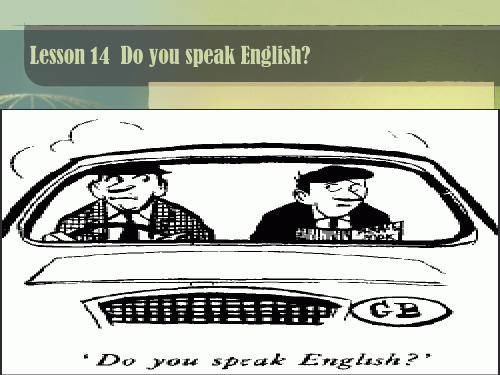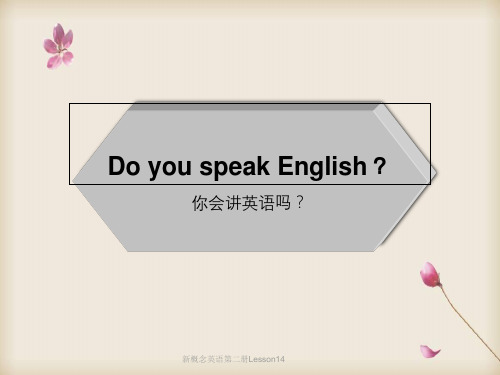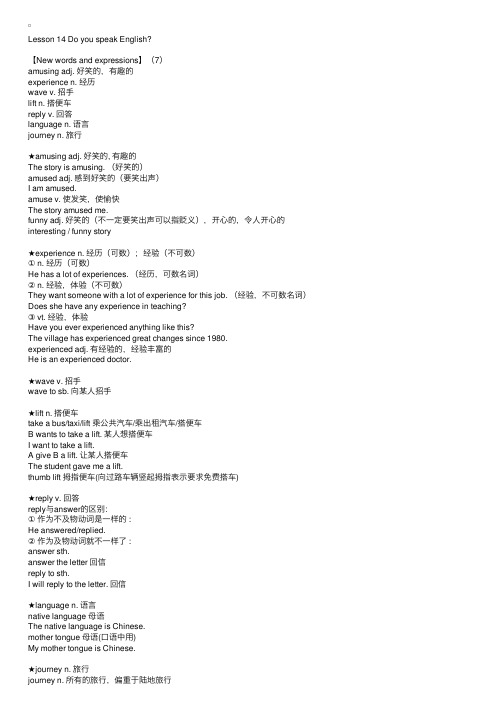(完整版)新概念英语第二册:第14课课文详解及语法解析
(完整版)新概念第二册第14课课文讲解.doc

Lesson 14 Do you speak English?I had an amusing experience last year. After I had left a small village in the south of France, I drove on to the next town. On the way, a young man waved to me. I stopped andhe asked me for a lift. As soon as he had got into the car, I said good morning to him in French and he replied in the same language. Apart from a few words, I do not know anyFrench at all. Neither of us spoke during the journey. I had nearly reached the town, whenthe young man suddenly said, very slowly, "Do you speak English?' As I soon learnt, hewas English himself!'参考译文去年我有过一次有趣的经历。
在离开法国南部的一个小村庄后,我继续驶往下一个城镇。
途中,一个青年人向我招手。
我把车停下,他向我提出要求搭车。
他一上车,我就用法语向他问早上好,他也同样用法语回答我。
除了个别几个单词外,我根本不会法语。
旅途中我们谁也没讲话。
就要到达那个镇时,那青年突然开了口,慢慢地说道:“你会讲英语吗?”我很快了解到,他自己就是个英国人!【New words and expressions】生词和短语★amusing adj.好笑的,有趣的amused: 感到好笑的amuse v.动词后面会加人做宾语The story amused me.The story is amusing.I am amused.interesting: 有意思The book is interesting.The book is amusing.funny: 好笑的,可以指,开心的,令人开心的interesting/funny story★experience n.、体:不可数名、感受:可数名He has a lot of experience. He has a lot of experiences.Experience is the best teacher .是最好的老。
新概念第二册第14课

【课文讲解】
1.On the way, a young man waved to me. • on one’s way to … 在某人去某地的路上
on one’s way home 某人回家的路上
P30 on the way/ in the way /by the way/ in this way
② vt. 挥动,摇动 wave a hand at sb向某人招手 他们挥着国旗,欢迎我们。 They waved the national flag and welcomed us.
6
New Words and Expressions
wave
① v. 招手
wave to sb. 向某人招手 wave goodbye to sb.向某人挥手再见 他看见我们时,向我们挥了挥手. He waved to us when she saw us.
mother/native language the second language spoken language written language foreign language body language sign language
12
New Words a, 偏重于陆地旅行 2 hours' journey;3 days' journey(三天路 程) 去旅行 go on a journey travel / travelling n. 周游(长途旅行) trip n. 短距离旅行 (时间或距离上较短) tour n. 游玩,环游(为了玩) voyage n. 旅行(海上) flight n. 空中飞行
reply [ri'plai] v. 回答 language ['læ ŋɡwidʒ] n. 语言 journey ['dʒə:ni] n. 旅行
新概念英语第二册Lesson14

【New words and expressions】
➶ wave v. 招手 ➶ wave to sb;向某人招手
新概念英语第二册Lesson14
【New words and expressions】
⛄ ★lift n. 搭便车 ⛄ be动词+形容词/介词 ⛄ be动词后面不能是名词,一旦是名词,就认为主语和
新概念英语第二册Lesson14
【Further notes on the text】
• 参考译文 • 去年我有过一次有趣的经历。在离开法国南部的一个
小村庄后,我继续驶往下一个城镇。途中,一个青年 人向我招手。我把车停下,他向我提出要求搭车。他 一上车,我就用法语向他问早上好,他也同样用法语 回答我。除了个别几个单词外,我根本不会法语。旅 途中我们谁也没讲话。就要到达那个镇时,那青年突 然开了口,慢慢地说道“你会讲英语吗?” 我很快了解 到,他自己就是个英国人!
新概念英语第二册Lesson14
【New words and expressions】
♚ experience n. 经历 ♚ 经验:不可数名词 ♚ 经历:可数名词 ♚ He has a lot of experience. ♚ He has a lot of experiences. ♚ +s(a/an),经历;原形,经验 ♚ experienced:有经验的 ♚ He is an experienced doctor.
发出信号
新概念英语第二册Lesson14
【Further notes on the text】
♚ 课文内容: ♚ I stopped and he asked me for a lift. As soon as
新概念英语第二册Lesson14

➢ 在离开法国南部的一个小村庄之后,我继 续驶往下一个城镇。
➢பைடு நூலகம்语言点1 此句时间状语从句为“after +过 去完成时〞,主句用一般过去时。
【Further notes on the text】
♚ Notes on the text课文注文注释释 ♚ 1 drove on to the next town. 我继续驶往下一个城
镇。 句中的副词on有“继续地〞;“不停顿地〞的 意思。 ♚ 2 on the way, 在途中。 ♚ 3 ask for a lift, 要求搭车。 ♚ 4 apart from, 除了……以外。 ♚ 5 As I soon learnt, he was English himself!我很快 就知道,他自己就是个英国人。
⛄ 本文语法:过去完成时 ⛄ 语法归纳:过去完成时的形式:had +过去分词 ⛄ 表示过去某个时间以前已经完成的动作或存在的状态。一般总结为:过
去的过去发生到过去完毕。经常与过去时间状语连用。
⛄ By the end of last month I had worked in New Oriental School for six years.
other? • What did the young man say at the end of the
journey? • Was he English himself ,or was he French?
【Further notes on the text】
_新概念英语第二册第14课 课文详解、翻译及语法

Lesson 14Do you speak English?你会讲英语吗?First listen and then answer the question.听录音,然后回答以下问题。
Did the young man speak English?I had an amusing experience last year. After I had left a small village in the south of France, I drove on to the next town. On the way, a young man waved to me. I stopped and he asked me for a lift. As soon as he had got into the car, I said good morning to him in French and he replied in the same language. Apart from a few words, I do not know any French at all. Neither of us spoke during the journey. I had nearly reached the town, when the young man suddenly said, very slowly, "Do you speak English?' As I soon learnt, he was English himself!'New words and expressions 生词和短语amusing adj. 好笑的,有趣的experience n. 经历wave v. 招手lift n. 搭便车reply v. 回答language n. 语言journey n. 旅行参考译文去年我有过一次有趣的经历。
(完整版)新概念英语第二册:第14课课文详解及语法解析

新概念英语第二册:第14课课文详解及语法解析课文详注 Further notes on the text1.After I had left a small village in the south of France, I drove on to the next town.在离开法国南部的一个小村庄后,我继续驶往下一个城镇。
(1)表示一个大范围中的某一个地方时要用介词in:Beijing is in the north of China.北京位于中国的北部。
(2)副词on紧跟在动词后面时能够表示“向前”、“继续下去”等意义:He talked on until everybody had gone.他滔滔不绝地讲到大家都走了。
I was reading when my friend called. After he had gone,I went on to read.我朋友来看我时我正在看书。
他走了以后我便继续看书。
2.I stopped and he asked me for a lift.我把车停下,他向我提出要求搭车。
名词lift的含义之一是“(给步行者)搭便车”、“免费搭车”:Last night, I had to walk home. No one would give me a lift.昨晚我不得不走回家。
谁也不愿意让我搭车。
I was lucky today. I got a lift soon after I had leftthe village.我今天运气好,离开村子不久就搭上了便车。
3.As soon as he had got into the car, I said goodmorning to him in French and he replied in the same language.他一上车,我就用法语向他问早上好,他也同样用法语回答我。
(1)表示时间的固定短语as soon as通常表示“一……就……”,即两个动词之间相隔时间非常短:Tell him the news as soon as you meet him.你一遇见他就把这消息告诉他。
新概念英语第二册笔记新版:第14课

Lesson 14 Do you speak English?【New words and expressions】(7)amusing adj. 好笑的,有趣的experience n. 经历wave v. 招⼿lift n. 搭便车reply v. 回答language n. 语⾔journey n. 旅⾏★amusing adj. 好笑的, 有趣的The story is amusing. (好笑的)amused adj. 感到好笑的(要笑出声)I am amused.amuse v. 使发笑,使愉快The story amused me.funny adj. 好笑的(不⼀定要笑出声可以指贬义),开⼼的,令⼈开⼼的interesting / funny story★experience n. 经历(可数);经验(不可数)① n. 经历(可数)He has a lot of experiences. (经历,可数名词)② n. 经验,体验(不可数)They want someone with a lot of experience for this job. (经验,不可数名词)Does she have any experience in teaching?③ vt. 经验,体验Have you ever experienced anything like this?The village has experienced great changes since 1980.experienced adj. 有经验的,经验丰富的He is an experienced doctor.★wave v. 招⼿wave to sb. 向某⼈招⼿★lift n. 搭便车take a bus/taxi/lift 乘公共汽车/乘出租汽车/搭便车B wants to take a lift. 某⼈想搭便车I want to take a lift.A giveB a lift. 让某⼈搭便车The student gave me a lift.thumb lift 拇指便车(向过路车辆竖起拇指表⽰要求免费搭车)★reply v. 回答reply与answer的区别:①作为不及物动词是⼀样的 :He answered/replied.②作为及物动词就不⼀样了 :answer sth.answer the letter 回信reply to sth.I will reply to the letter. 回信★language n. 语⾔native language 母语The native language is Chinese.mother tongue 母语(⼝语中⽤)My mother tongue is Chinese.★journey n. 旅⾏journey n. 所有的旅⾏,偏重于陆地旅⾏go on a journey2 hours' journey;3 days' journey(三天路程)trip n. 短距离旅⾏或出差(时间或距离上较短)go on a trip = go on businesstravel n. 周游(长途旅⾏)tour n. 游玩(为了玩)tourist n. 游客voyage n. 旅⾏(海上)flight n. 空中飞⾏【Text】I had an amusing experience last year. After I had left a small village in the south of France, I drove on to the next town. On the way, a young man waved to me. I stopped and he asked me for a lift. As soon as he had got into the car, I said good morning to him in French and he replied in the same language. Apart from a few words, I do not know any French at all. Neither of us spoke during the journey. I had nearly reached the town, when the young man suddenly said, very slowly, "Do you speak English?' As I soon learnt, he was English himself!'参考译⽂去年我有过⼀次有趣的经历. 在离开法国南部的⼀个⼩村庄后, 我继续驶往下⼀个城镇. 途中, ⼀个青年⼈向我招⼿. 我把车停下,他向我提出要求搭车. 他⼀上车, 我就⽤法语向他问早上好, 他也同样⽤法语回答我. 除了个别⼏个单词外, 我根本不会法语. 旅途中我们谁也没讲话. 就要到达那个镇时, 那青年突然开了⼝, 慢慢地说道 : “你会讲英语吗?”我很快了解到, 他⾃⼰就是个英国⼈!【课⽂讲解】1、After I had left a small village in the south of France, I drove on to the next town.after引导的从句如果⼀个是过去时,⼀个是过去完成时,那⼀定是从句⽤过去完成时;before引导的从句表⽰“在……之前”,主句发⽣在从句之前, 主句⽤过去完成时。
新概念英语第二册逐句精讲语言点第14课(3)

新概念英语第二册逐句精讲语言点第14课(3)Lesson 14 Do you speak English?课文内容:I had an amusing experience last year. After I had left a small village in the south of France, I drove on to the next town. On the way, a young man waved to me. I stopped and he asked me for a lift. As soon as he had got into the car, I said good morning to him in French and he replied in the same language. Apart from a few words, I do not know any French at all. Neither of us spoke during the journey. I had nearly reached the town, when the young man suddenly said, very slowly, ‘Do you speak English?' As I soon learnt, he was English himself.精讲笔记:7.Neither of us spoke during the journey.在旅途中,我们两个人都没有说话。
语言点比较学习“...of+范围”结构的短语:1)neither of两者中任何一个都不能够(谓语动词一般用单数)Neither of them has train tickets.他们俩都没有火车票。
2)either of两者中任何一个都能够Either of the brothers will come.这兄弟俩中会来一个。
- 1、下载文档前请自行甄别文档内容的完整性,平台不提供额外的编辑、内容补充、找答案等附加服务。
- 2、"仅部分预览"的文档,不可在线预览部分如存在完整性等问题,可反馈申请退款(可完整预览的文档不适用该条件!)。
- 3、如文档侵犯您的权益,请联系客服反馈,我们会尽快为您处理(人工客服工作时间:9:00-18:30)。
新概念英语第二册:第14课课文详解及语法解析课文详注 Further notes on the text
1。
After I had left a small village in the south of France, I
drove on to the next town.
在离开法国南部的一个小村庄后,我继续驶往下一个城镇。
(1)表示一个大范围中的某一个地方时要用介词in:
Beijing is in the north of China。
北京位于中国的北部。
(2)副词on紧跟在动词后面时能够表示“向前"、“继续下去”等意义:
He talked on until everybody had gone。
他滔滔不绝地讲到大家都走了。
I was reading when my friend called。
After he had gone, I went
on to read。
我朋友来看我时我正在看书。
他走了以后我便继续看书。
2.I stopped and he asked me for a lift。
我把车停下,他向我提出要求搭车.
名词lift的含义之一是“(给步行者)搭便车”、“免费搭车”:
Last night, I had to walk home. No one would give me a lift.
昨晚我不得不走回家。
谁也不愿意让我搭车。
I was lucky today。
I got a lift soon after I had left the village.
我今天运气好,离开村子不久就搭上了便车。
3.As soon as he had got into the car, I said good morning to him in French and he replied in the same language.
他一上车,我就用法语向他问早上好,他也同样用法语回答我。
(1)表示时间的固定短语as soon as通常表示“一……就……”,即两个动词之间相隔时间非常短:
Tell him the news as soon as you meet him.
你一遇见他就把这消息告诉他。
(2)表示用某种语言作为交际手段时介词用in,表示讲某种语言时能够不加介:
speak English/ French
讲英语/法语
That book is written in German。
那本书是用德语写的.
He replied the question in English.
他用英语回答了这个问题。
语法 Grammar in use
过去完成时(The simple past perfect tense)
过去完成时由 had+ 过去分词构成,它表示过去某时或某动作发生之前已经完成的动作或情况,即“较早的过去".在用过去完成时态的句子中,常用的连词when, after, as soon
as, until, by that time等:
When I woke up in the morning, she had already had her breakfast.
当我早上醒来时,她已经吃过早饭了。
After he had said goodbye to us all, Captain Alison started his journey.
当艾利森船长和我们大家都道了别之后,他就启程了。
Did you really ring the police?
你真的给警方打电话了?
It was a mistake。
I realized it as soon as I had rung them.
我犯了个错误.刚给他们打完电话我就意识到了。
I didn’t know that she was a famous actress until you had told me。
直到你告诉我时我才知道她是位名演员。
常与现在完成时连用的副词如already, just, never,never…before也常与过去完成时连用,以强调事件发生的先后次序:
The boys loved the zoo. They had never seen wild animals before.
男孩们喜欢动物园,以前他们从没见过野兽。
在有些用过去完成时的句子中没有明确的时间状语,但通过上下文能够看出动作发生的先后:
The bus finally came. I had waited for 40 minutes。
公交车终于来了.我已经等了40分钟。
